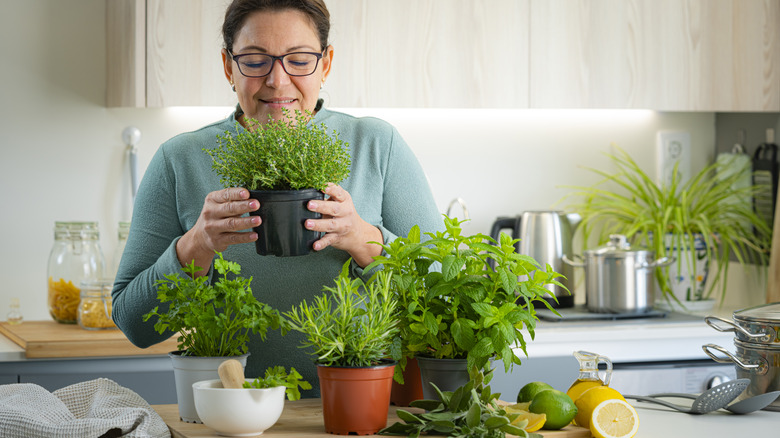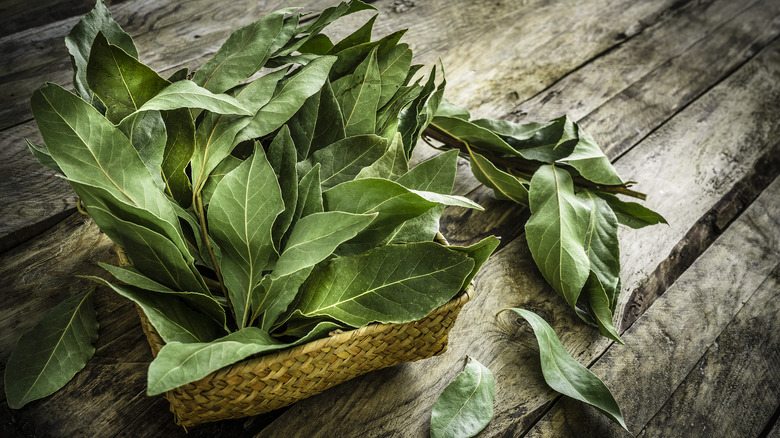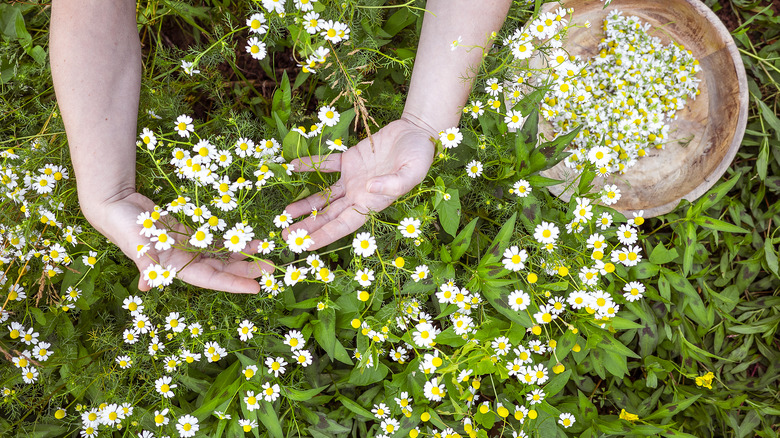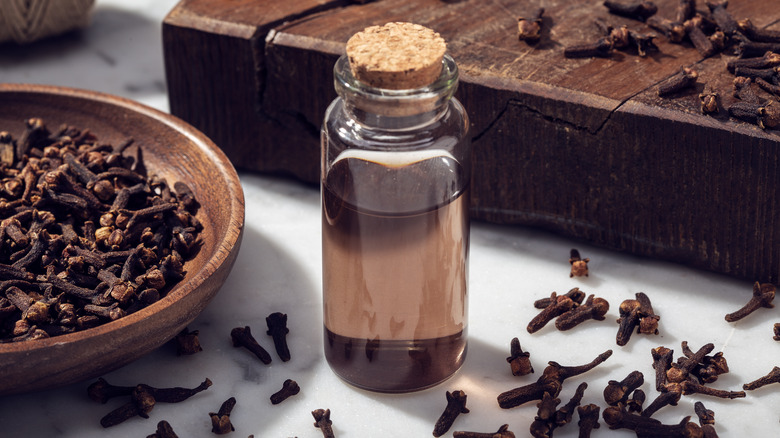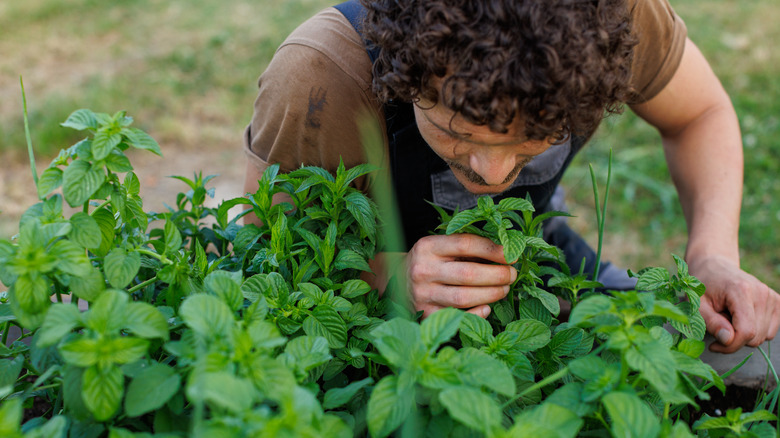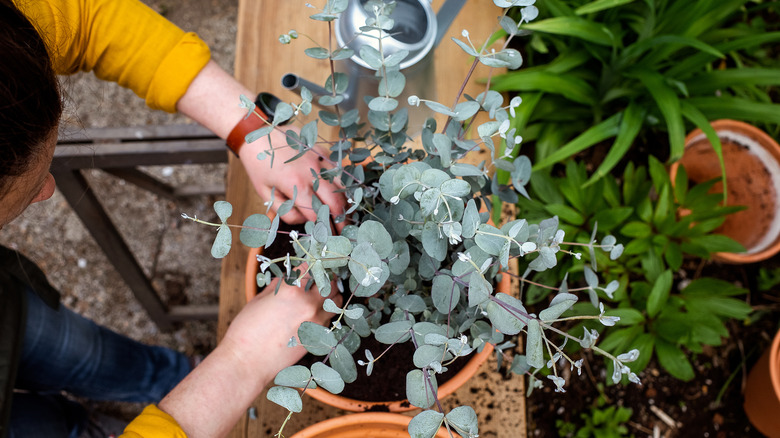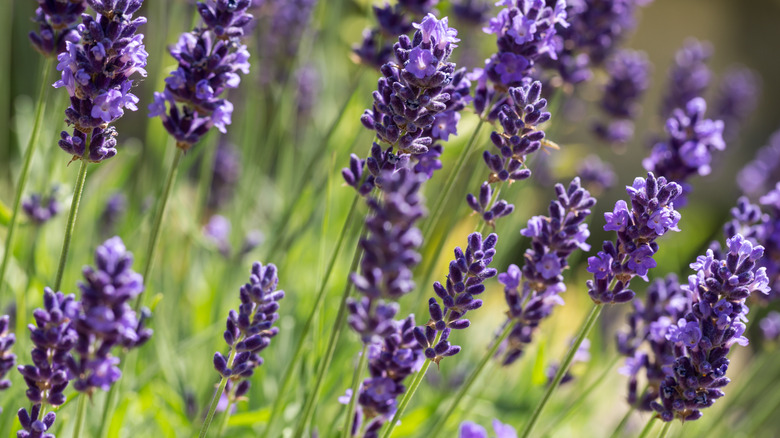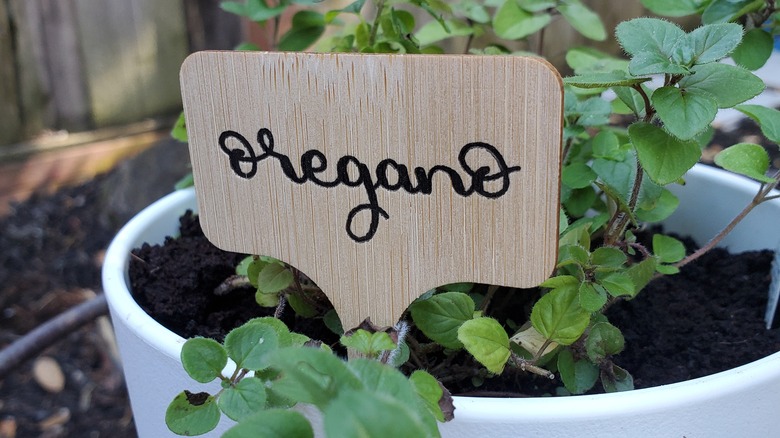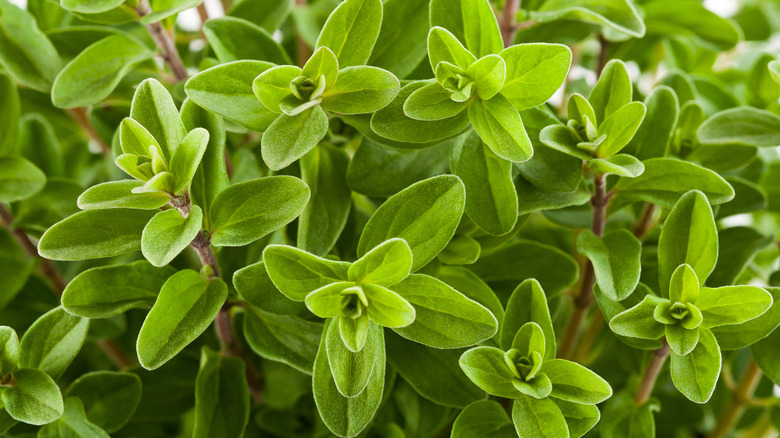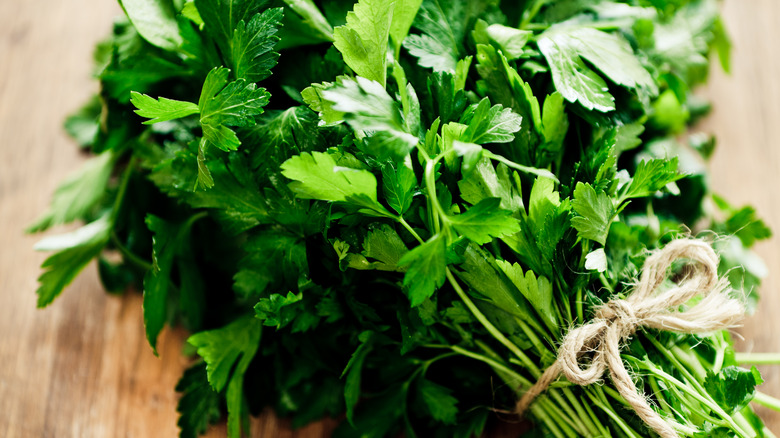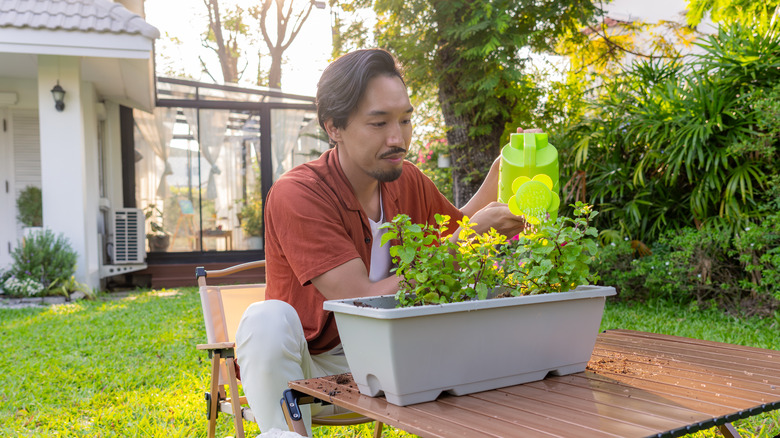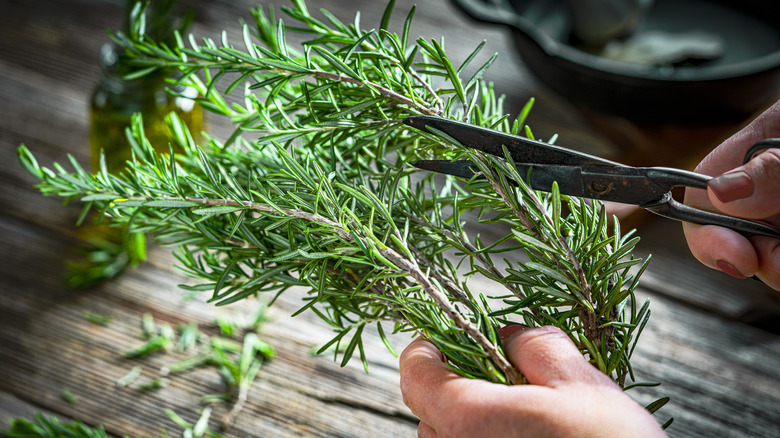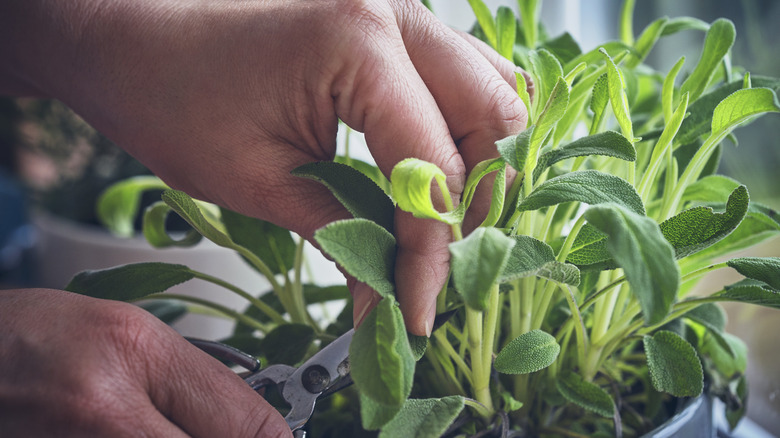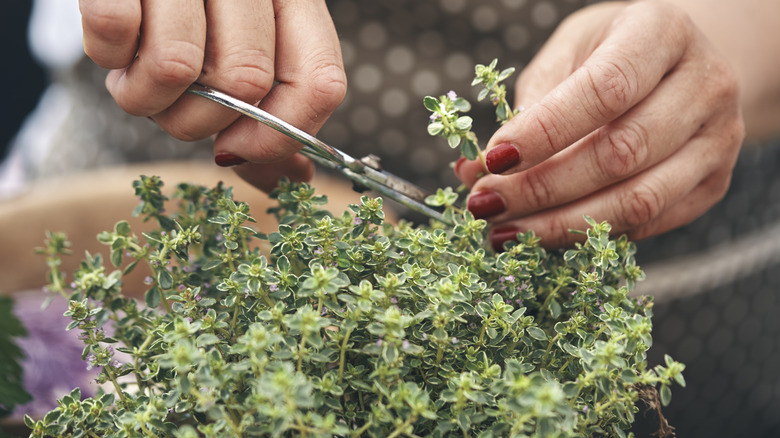Use These 15 Common Herbs From Your Garden For A Cleaner Home
A fragrant herb garden is a highlight of any backyard, and the promise of the delicious, savory flavors the herbs will eventually add to your culinary efforts makes it all the more enticing. But did you know you can also use your fresh garden herbs to help keep your house clean? Herbs contain natural oils and aromas that can often act as deodorizers, but several also contain disinfectant properties that attack bacteria, fungal infections, and viruses. Herbs such as basil, ginger, and over a dozen others can be used as natural cleansing agents around the house.
Slightly different from spices, herbs are generally the leaves and non-woody stems of aromatic edible plants. They can either be fresh or dried, and while dried versions are often found in the spice rack, spices are a different animal — usually crushed from the bark, seeds, or roots of their parent plant. Spices are also known to have multiple uses outside the kitchen, but that's another article. For now, here are 15 common herbs you can use for a cleaner home.
Basil
Basil is a delicious herb often found in Italian dishes and other Mediterranean cuisines, but more reasons to add basil to your garden are its uses as a cleaning product, air freshener, and insect repellent. Mixed with water and white vinegar, basil's antifungal and antimicrobial properties can help clean and disinfect your home, while adding basil leaves to vodka or rubbing alcohol makes a nice room deodorizer. You can also keep flies outside where they belong with basil steeped in boiling distilled water to create a repelling spray.
Bay leaves
Flavorful, decorative, and aromatic, the bay leaf is the common garden herb that works wonders for repelling household pests. Hang up a sprig or fill a decorative bowl with a bay leaf potpourri. Steep the leaves in vinegar and add them to a water spritzer for a refreshing pantry spray. Or simply put a single bay leaf inside each of your dry goods packages, and creepy-crawlies will stay away. Insects, from silverfish to spiders, cockroaches to earwigs, are repelled by the scent of bay leaves. As if that's not enough of an incentive, mice seem to hate it too.
Chamomile
Any time you've felt under the weather, maybe you've reached for some chamomile tea, as it's known for warding off colds as well as soothing aches and pains. But there's more to chamomile than just tea; it's actually an herb — hence herbal tea — that you can plant in your garden. It's a natural and nontoxic pesticide, a reliable companion plant, and excellent at removing limescale from your faucets, plumbing, and tile. Add a sachet of chamomile to distilled water and a tiny bit of citric acid for a fresh-scented and chemical-free cleaner for bathrooms and kitchens.
Clove oil
Cloves are most commonly known as a spice, but clove oil is actually extracted from the plant's leaves – the herb — from which traditional clove spices come. This essential oil carries antimicrobial, antifungal, and insecticidal properties. Make a convenient spray solution by mixing ½ teaspoon of clove oil into 4 cups of water, and the clove oil becomes a great defense against mold and mildew growing in your grout. Cut the oil in the spray to one or two drops for an insect repellant and plant spray you can use inside and out.
Common mint, or spearmint
Multiple varieties of mint exist, but when not otherwise specified, gardening publications are likely referring to spearmint (Mentha spicata). Already known for its bright, crisp scent, mint makes a great tub and tile cleaner when mixed with baking soda and vinegar, or an all-purpose cleaning spray combined with water, vinegar, and lemon juice. You can also sprinkle it around the house before vacuuming (in dried or oil form) to freshen up your smelly carpets. However, mint can be an overpowering scent, so use it sparingly, even if it's a household favorite.
Eucalyptus
Eucalyptus is a popular scent, and eucalyptus oil is also antibacterial. So, if you want a fresh and clean bedroom, bathroom, or any room, you could do much worse than add eucalyptus to your cleaning regimen. You can distill your own eucalyptus oil out of fresh leaves or buy it ready-made, but then that oil can be used to mop your floors, shine your stainless steel, condition your leather furniture, deodorize your rugs, and freshen your linens, just to name a few. It's also a handy insect repellent. In short, eucalyptus is a marvel.
Lavender
A drop of lavender on your pillow or added to your bath has some wonderful calming effects, but it can also be used around the house for cleaning and deodorizing. Pet odors, cooking smells, and the like seep into our furniture and hang around indefinitely, but lavender essential oil can banish bad smells from your upholstery. It's also naturally antibacterial and becomes an effective disinfectant when infused with vinegar. Dilute with water to clean your home's hard surfaces. And if that's not enough, it also repels fleas, so make sure to spritz the pet beds liberally.
Lemongrass
For an all-purpose cleaner, look no further than the lemongrass in your herb garden. It's antiviral, antifungal, and antibacterial and has that great citrusy scent. Make your own lemongrass oil by coarsely chopping and crushing the stalks into a Mason jar of neutral carrier oil and setting it in sunlight for two days. Then, strain the oil into a dark glass bottle. Use a few drops in air diffusers loads of laundry, or add to olive oil for a wood polish. Distill with vinegar and water for a disinfectant spray to use just about everywhere else.
Oregano
There are dozens of reasons why growing oregano in your garden is a good move, but you might not have realized that attacking norovirus was one of them. Oregano oil is high in antimicrobial properties, and using it as a disinfectant cleanser around your house can possibly help prevent the debilitating virus before it infects you. (It doesn't work after the fact: if you are sick with norovirus, see your doctor.) Oregano oil can be bought ready-made, but if you have the herbs on hand, you can extract it yourself from the leaves for a healthy, nontoxic cleaning option.
Marjoram
Not to be confused with oregano, marjoram is actually a little sweeter and milder. However, the oils derived from marjoram leaves are also natural disinfectants. Diluted with distilled water and vinegar, it can be used as an antibacterial spray to clean all your nonporous surfaces. Another helpful way to brighten up your home's overall feel is to add marjoram essential oil to your air diffuser for its purifying capabilities and minty, fresh, woodsy scent. No matter how much you scrub your home, a musty smell can linger, but if your house smells clean, it feels clean.
Parsley
Most people think of parsley as little more than a garnish, if they think of it at all, but it actually has many health benefits for your heart, bones, eyes, and overall longevity. Its extract is also naturally antibacterial and antifungal, and could be effective against such nasty ailments as listeria and salmonella. You can find eco-friendly parsley products, but don't be afraid to make your own by pressing the oil and adding it to a vinegar and water solution.
Peppermint
Peppermint (Mentha piperita) is a natural insect repellent. Ants, fleas, and other unwanted bugs hate the scent and might stay far away. Just a few drops of peppermint oil diluted with water make an effective bug spray that is good for your entryways, basements, and even pet beds. You can also use peppermint oil mixed with water, alcohol, and vinegar as a streak-free glass and window cleaner. Similarly to other mint products, you can drop the oil or some crushed, dried leaves onto your carpet for an hour before vacuuming them up. The fresh scent will remain.
Rosemary
Dusting away cobwebs can feel like a never-ending chore. One way to cut down on the amount of cobwebs you need to remove from your home is to reduce the number of spiders entering it. It just so happens the rosemary in your garden is a great way to keep spiders out. Unlike other herbal remedies, rosemary isn't just effective as a deterrent due to its smell. Instead, the herb acts negatively on the spider's physiology, disrupting their pheromone sensors and overall mobility. Eventually, it can even paralyze their breathing, suffocating them.
Sage
Keeping a clean space has been shown to improve a person's overall mood, but sometimes, it also needs spiritual purification. Sage — mainly white sage — is widely known for this ritual, but since it's sacred to certain Native American tribes, it can be seen as culturally insensitive to purchase the herb, which is often stolen off protected land. However, if you grow your own sage for your own personal use, then native lands aren't being exploited. The process is called smudging, but no actual smudges are left behind, just the lingering scent of the spiritually cleansing smoke.
Thyme
Thyme is a natural fungicide, which makes it a great addition to your cleaning routines in the damp areas of your home, such as the bathroom, kitchen, and laundry room. For an effective all-purpose cleaner for these spaces, crush your thyme and add it to a Mason jar of vinegar. Let the combo steep for at least one full day, adding vinegar as needed, before straining it into a spray bottle. You can dilute it with water if you want, but it's unnecessary. In addition to your tubs, sinks, and floors, you can use it to help disinfect cutting boards.
